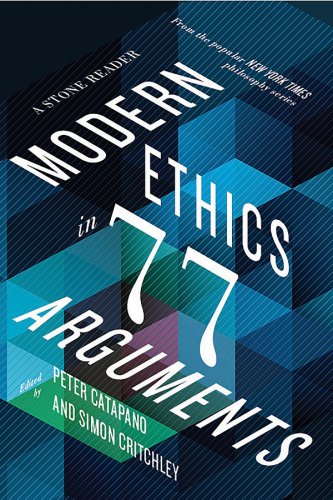
Modern Ethics in 77 Arguments
A Stone Reader
- اطلاعات
- نقد و بررسی
- دیدگاه کاربران
نقد و بررسی

June 1, 2017
Guns, race, and human rights are among the varied ethical issues tackled in a wide-ranging collection.New York Times online opinion editor Catapano and philosophy professor Critchley (The New School) have selected more than 40 essays from their previous collection, The Stone Reader: Modern Philosophy in 133 Arguments (2015) and added more than 30 recent pieces from the Times' "Stone" column, all focused specifically on ethics. A trimmer collection than The Stone Reader, this one, the editors believe, will have more appeal for classroom use. The essays are grouped into a dozen categories: existence, human nature, morality, religion, government, citizenship, guns, race, gender, family, eating, and the future. Topics range from the broad (the meaning of life) to the specific (should we eat animals?). No previous knowledge of philosophy is required to follow the writers' arguments, and many essays are likely to spur interest in the philosophers discussed. In "How Should We Respond to Evil?" for example, Episcopal priest Steven Paulikas brings in French philosopher Paul Ricoeur, who believed that responses to evil must be focused on alleviating victims' suffering rather than on revenge; Paulikas contrasts that view with that of Bill O'Reilly, who announced on The Late Show that the proper response to evil is "destroy it." Besides Ricoeur, other philosophers discussed include Aristotle, Plato, Spinoza, Hume, Kant, William James, and Bertrand Russell. Moral relativism recurs as a theme: Adam Etinson, writing about the problem of ethnocentricity, cites Montaigne, who noticed humans' tendency to privilege their own cultural beliefs and practices over those of other cultures, an issue also considered by philosopher and historian Justin E. H. Smith in "Philosophy's Western Bias." Philosophy professor Carol Rovane offers a proposal for resolving moral differences by examining "different moral circumstances" for which individuals "need quite different moral truths." Overall, the volume asks readers to examine their own contexts and biases for making ethical decisions and judging the behavior of others. An accessible volume of thoughtful, concise contributions.
COPYRIGHT(2017) Kirkus Reviews, ALL RIGHTS RESERVED.

July 1, 2017
Catapano (opinion editor, New York Times) and Critchley (philosophy, The New Sch.) gather 77 articles on ethics, almost all by philosophers, that first appeared in the Times' philosophy column, "The Stone." The articles cover a range of issues, both theoretical and practical, such as: Are morals relative to culture? Carol Rovane defends a version of moral relativism, but Paul Boghossian argues that such a view is incoherent. What is the relation between morality and religion? What is the relevance of evolution to ethics? Readers will find much diversity in the answers offered, and this diversity does not disappear when policy issues arise. Jeff McMahan suggests that animal suffering has radical implications, not only for what we eat but also possibly for how we deal with predatory species of animals. Amia Srinivasan raises problems for the free market libertarianism of Robert Nozick, and Gary Gutting suggests that most people do not need guns. The contributors who address race relations, such as George Yancy, find much that needs reform; and the same is true of those who write on family and gender issues. VERDICT Highly recommended for anyone interested in the current issues of contemporary moral philosophy.--David Gordon, Ludwig von Mises Inst., Auburn, AL
Copyright 2017 Library Journal, LLC Used with permission.




دیدگاه کاربران